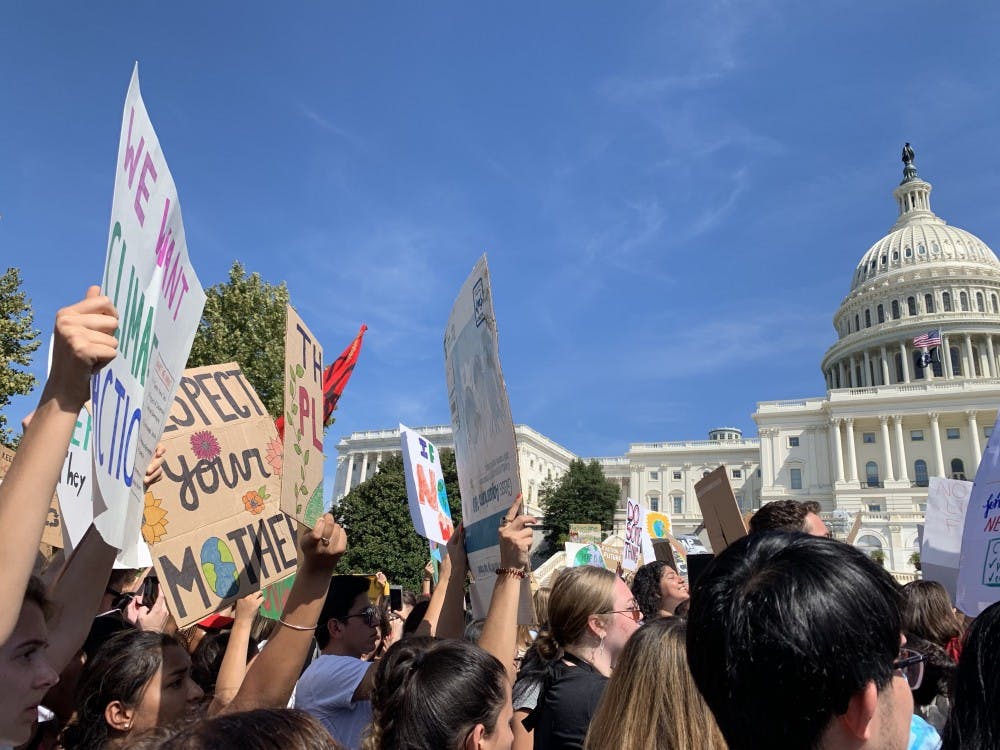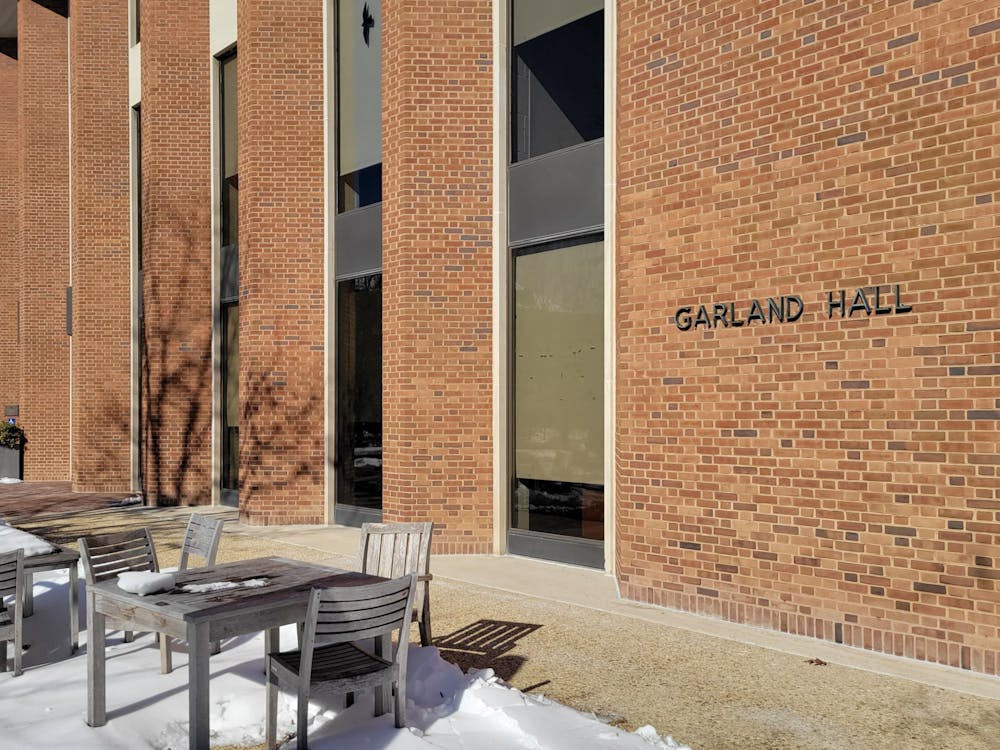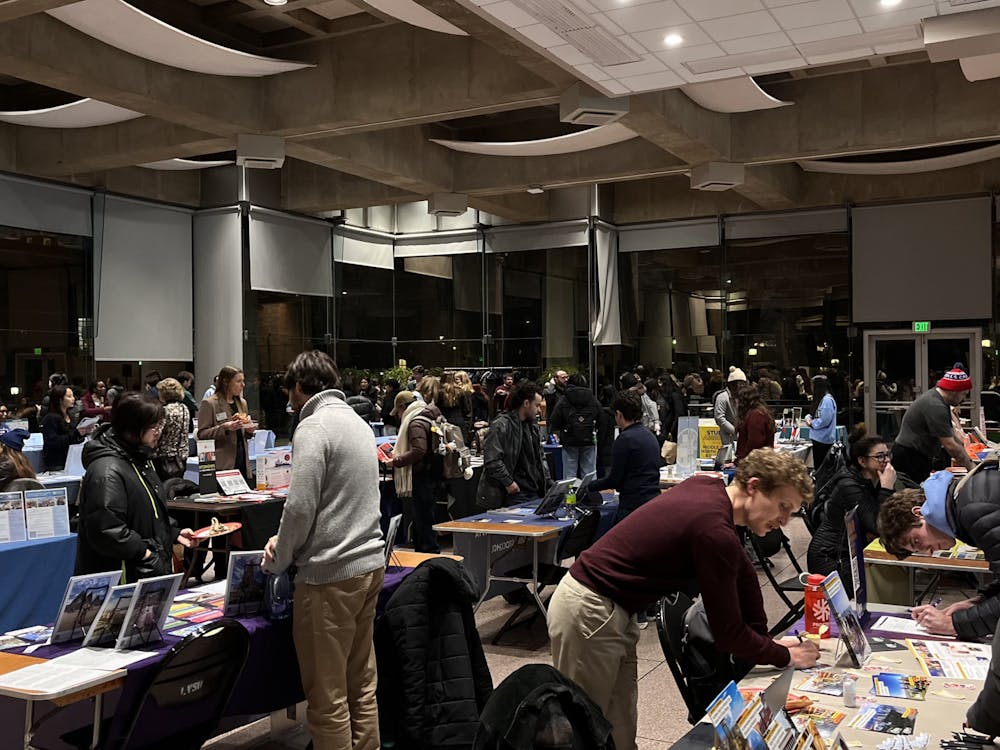Climate activists around the world took part in a mass strike on Friday. Refuel Our Future, an environmental activist group on campus, led about 20 Hopkins students to the climate strike in D.C. Speakers protested government inaction and demanded justice for communities of color impacted by pollution, leading thousands of demonstrators from John Marshall Park to the west lawn of the United States Capitol.
The News-Letter spoke with students who attended the rally and other Hopkins affiliates about their efforts to promote sustainability.
D.C. Climate Strike
Freshman Juneau Wang, attended the strike. Although he expressed his enthusiasm for climate activism, he also criticized what he characterized as the University’s current environmental inaction.
“Many of the people in power are not doing anything to roll back the damage,” he said. “All the little green measures that Hopkins takes don’t mean anything when they’re pumping huge sums of money into the coffers of companies funding climate destruction.”
This April the University announced plans to buy 253,000 megawatt hours of solar power per year starting in 2021 as part of its plan to reduce carbon emissions by 51 percent across all divisions by 2025. This change is meant to allow the Homewood, Peabody, the School of Advanced International Studies and other campuses to switch to 100-percent solar power.
Refuel Our Future Co-President Elly Ren called on the University to fully divest from its holdings in fossil fuels, which the group has demanded for years. Ren shared her optimism based on other universities making similar moves, citing the University of California’s divestment pledge last week.
“This shows that student organizing totally works,” she said. “But it takes a village.”
Speakers at the strike included Representatives Jerry Nadler (D-NY) and Kathy Castor (D-FL). Nadler, along with 94 other House Democrats, is a co-sponsor of the Green New Deal (GND). The GND is a proposed piece of legislation that aims to roll out labor programs so that the U.S. economy runs entirely on renewable energy sources by 2030.
Castor, chairwoman of the House Select Committee on the Climate Crisis, announced that the committee is taking public input as it drafts a climate action bill. Although she did not endorse the GND, the committee’s Communications Director Aaron Huertas clarified Castor’s plans regarding the GND in an email to The News-Letter.
“The Congressional climate action plan will ‘…borrow from the Green New Deal,’” Huertas wrote. “[Nadler]’s also said the plan will be consistent with the ambition of the Green New Deal (meaning the level of carbon pollution cuts we need).”
Speakers alluded to the civil rights movement during the rally. For example, Castor evoked the 1963 March on Washington led by Martin Luther King, Jr.
In addition, Renaldo Pearson, director of external affairs for the activist group Democracy911, sang “Keep Your Eyes on the Prize,” a popular folk song during the Civil Rights Movement. He also underscored the importance for climate activists to act swiftly.
“We are organizing not just with a moral urgency but an existential urgency,” Pearson said.
In an interview with The News-Letter, Ren stated that Refuel Our Future, which wants to support local climate protests, committed to attending the D.C. strike two weeks before the one in Baltimore was announced. She expressed concern that many Hopkins students are apathetic toward climate change, such as Ellicott City’s recent flooding.
She said that she felt motivated by the University’s announcement last week that it would not be renewing its contracts with the U.S. Department of Immigration Customs and Enforcement (ICE).
Sustainability efforts at Hopkins
When asked whether he would advocate for the University to fully divest from fossil fuels, Director of the Office of Sustainability Julian Goresko underscored the role of student input in an email to The News-Letter. Goresko was hired this April to optimize all nine divisions of the University’s food, water and energy consumption, along with its infrastructure, transportation and waste management.
“As someone new here, I’m still learning about all the ways students have contributed to shaping our thinking, but I can tell you that students’ passion for sustainability is a driving force for change at the university,” he wrote. “Students shouldn’t underestimate their voice and the willingness of administrators to collaborate on projects and ideas.”
In December 2017, the Board of Trustees voted to divest its endowment from thermal coal following Refuel Our Future’s recommendations.
Goresko also expressed his excitement for the new University-wide Sustainability Leadership Council (SLC) in an email to the University student body, which will bring together students, staff and faculty from all nine divisions to advise Provost Sunil Kumar on matters of sustainability.
He added that students can promote sustainability in numerous ways, such as by walking, biking and eating plant-based meals.
Junior Lana Weidgenant did not attend the D.C. climate strike on Friday. Instead, she spoke at the United Nations (UN) as part of its International Day of Peace Student Observance, where she and other young people presented their projects to tackle climate change and advocate peace.
On Saturday, she participated in the UN Youth Climate Summit, where she discussed her plans to increase the accessibility of plant-based options in order to decrease carbon emissions.
In July, Dunkin’ Donuts began marketing its first vegan breakfast sandwich to consumers in the New York City area as a result of an online petition that Weidgenant launched. Weidgenant, a Public Health major, is the co-president of Compassion, Awareness, and Responsible Eating for Farm Animals (CARE), an animal activist group on campus.
In an interview with The News-Letter, Weidgenant stressed the need for the GND.
“Economic mobilization is necessary because we have been delaying action for so long. We really need to change the way we function, we think about the climate crisis and we think about consumption patterns,” she said. “Business as usual and casual recycling initiatives are not going to be enough by any means.”
Weidgenant stated that students have been, for the large part, leading the climate change movement.
Sophomore Maya Flannery described her efforts with GreenHacks, the first sustainability hackathon at Hopkins, where students come together to form solutions to sustainability problems. She founded the group this spring.
“The idea is that we’ll be able to partner them with local sponsors around Baltimore and on campus to develop their ideas into a reality,” she said.
Flannery noted that though traditional hackathons appeal primarily to computer science majors, GreenHacks is intended to unite people from different backgrounds.
In a similar vein, the new Hopkins Ecological Design Initiative (HEDI) is meant to bring together students and professors from the Whiting School of Engineering and the Krieger School of Arts and Sciences. HEDI held their kickoff event on Keyser Quad on Friday, where students designed artwork to decorate a white geodesic dome and for use at the climate strikes.
HEDI Associate Director Nicole Labruto, a postdoctoral fellow in the Department of Anthropology, explained the initiative’s purpose.
“It’s an interdisciplinary forum on campus to promote conversations about ecology, the environment and the city of Baltimore,” she said. “We’re using design as a method and a rubric to... envision a better world as opposed to just thinking of the doom and gloom of climate change.”
Junior Lauren Paulet, HEDI’s program assistant, anticipates that the advisory board, which currently comprises mostly of professors, will expand to students. Currently, HEDI is planning a design competition for students of all majors.
Paulet elaborated on HEDI’s goals in an email to The News-Letter.
“Involving other students is key when we’re trying to encourage them to think positively about the future of our environment and the solutions they may bring about through action,” she wrote. “Each year, the initiative will tackle a thematic problem in ecology and design. This year, the theme is food systems.”
Paulet mentioned that HEDI will host workshops, seminars and community events in the future.
Goresko highlighted how the University has the opportunity to affect the greater Baltimore area.
“We have the ability to directly impact the local region through our decisions as an institution,” he wrote. “I’m proud of what Hopkins is doing, and part of my job is always to explore avenues for change that enhance our thinking and create new ideas and action on behalf of the institution.”
According to Goresko, the University’s energy consumption has remained the same over the past decade due to $80 million in energy efficiency investments at the Homewood and East Baltimore campuses. He stated that the University had plans for future energy system investments and other conservation projects.
Flannery argued that the majority of students do not prioritize sustainability.
“It’s seen as a niche topic and not really part of the culture of our school,” she said.
On the other hand, Goresko commended the student body for their efforts to promote sustainability.
“Hopkins students certainly care about sustainability and will become key decision-makers of tomorrow and will profoundly impact their workplaces and communities where they live,” he wrote. “Cultivating these values early in life is important to building future habits that will be beneficial for themselves and the planet.”





